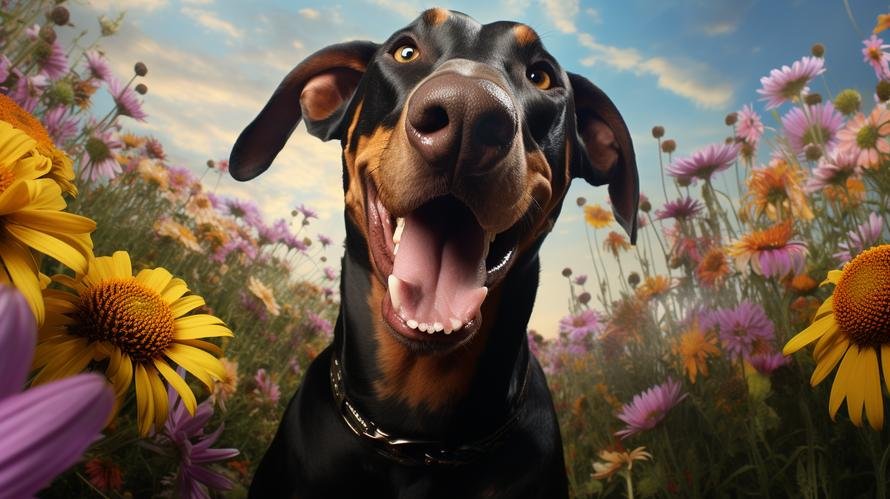At a swift glance, with their strong muscular frame and a sleek coat of fur, one could easily mistake the Doberman Pinscher for a four-legged Hollywood superstar. But did you know that these raven-haired beauties, often known for their immense loyalty and intelligence, have a unique dietary need compared to other domestic dogs?
That’s right! It might surprise you to learn that the chow they wolf down isn’t quite the same as what a Poodle, a Labrador, or a beagle might find appealing or benefit from. Canines, like us humans, are not a one-size-fits-all when it comes to nutrition. Each breed has its quirks, characteristics, and dietary needs. While our friendly Fido may not be as picky, your Doberman “Max” certainly will be in terms of dietary requirements!
To make sure our Doberman friends attain their peak physical condition and stay there, it’s crucial we learn about their unique nutrition requirements, potential health risks, and the ideal dog food that caters specifically to their needs.
A significant factor for a Doberman’s diet is their quick metabolism. Yes, despite their imposing physique, these dogs burn calories at a rapid rate, just like an Olympic sprinter! Because of their high metabolic rate, these dogs require a diet rich in high-quality proteins and fats. When we say high-quality proteins, we’re talking about real whole meats such as chicken, turkey, beef, and fish. While many dog foods tout “meat meal” as a key ingredient, it lacks the same nutritional benefits of whole meats. The same is true for fats. The best food for your Doberman Pinscher must include high-quality fats like fish oils and flaxseed to provide a maximum energy boost.
Apart from proteins and fats, a Doberman Pinscher will need a fair amount of complex carbohydrates. Wholesome grains such as brown rice, quinoa, or barley are ideal. They help to ensure that your faithful companion remains full without feeling fatigued. Additionally, including fibrous vegetables and fruits, such as sweet potatoes, apples, or carrots, can aid in promoting solid bowel movements and a healthy digestive system for your Doberman.
One unique health concern to remember for Doberman Pinschers is dilated cardiomyopathy (DCM). This heart disease enlarges the dog’s heart muscle, jeopardizing its ability to pump blood. To mitigate this risk, it’s advised to steer clear of dog foods that list peas, lentils, or potatoes as the main ingredient. A recipe rich in Taurine (an amino acid found in animal meats) might be beneficial since Taurine is known to support heart health.
Another health risk to look out for in Dobermans is Hip Dysplasia, an abnormal formation of the hip socket causing lameness and arthritis. Ensuring your dog’s food has an appropriate balance of Omega-3 and Omega-6 fatty acids and a good amount of Glucosamine and Chondroitin will help prevent or slow the progression of hip issues.
As for the feeding process itself, breaking your Doberman’s meals into smaller portions and feeding him several times a day, rather than a couple of big meals, works best. This can help reduce the risk of bloating, which is common in this breed and can lead to life-threatening conditions if not managed appropriately.
Does that mean you should hop into your car and storm the nearest pet store for a special Doberman dog food? Not necessarily. While there are breed-specific diets available, not all of them are required unless there is a medical necessity prescribed by your veterinarian. The secret lies in understanding what your Doberman Pinscher needs and finding dog food that fits the bill.
Before embarking on a shopping mission for your Doberman’s food, remember to check in with your trusted vet. They can guide you through the process and suggest suitable food options based on your dog’s age, weight, activity level, and health status.
To sum it up, Dobermans do have special dietary needs due to their unique metabolism, potential health risks, and their athletic physical structure. Paying attention to these needs can ensure your Doberman stays as healthy and vibrant as they are meant to be.
The right food choices, teamed with regular exercise, routine veterinary care, and undying love, will ensure that your Doberman Pinscher is not just another pretty face but a healthy, happy, and long-lived companion. After all, ensuring the health of our furry friends is no less than a labor of love. Whether you have a Doberman or any other breed, understanding their unique dietary needs is the first step towards responsible pet ownership.
So, go ahead, surprise “Max” with a bowl of nutrition-rich, high-quality dog food today, in line with his special dietary needs because a well-fed Doberman is a happy Doberman! And as we all know, a happy dog means a happy life!



